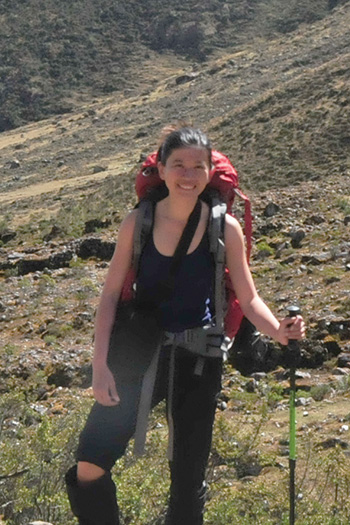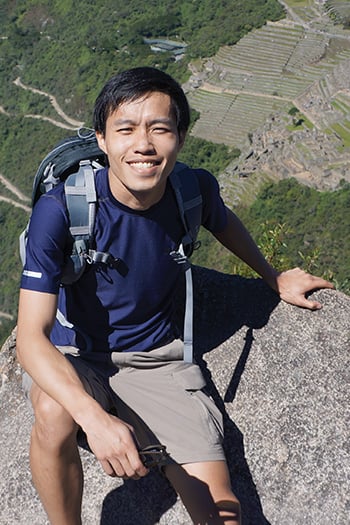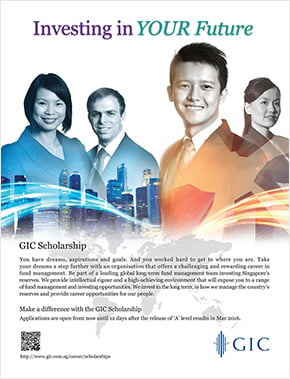GIC (previously known
as Government of
Singapore Investment
Corporation) is a
fund manager that
manages most of the
Government’s financial
assets. It has a long
investment horizon as
it seeks to contribute
to present and
future generations of
Singaporeans.
Singapore's striking edge is her infinite
potential in spite of her lack of
natural resources. In fact, it is rare
amongst countries with no natural resources
to have a sovereign wealth fund – let alone
have investment returns from her reserves
strengthen social security nets, R&D, education
and the physical environment. GIC is tasked
with generating good long-term returns on the
reserves it manages so that Singapore can
continue to invest in these areas.
GIC’s investments extend beyond asset
classes – it takes great pride in investing in its
people. One of the ways it exemplifies this is
through the GIC Scholarship. We talk to two GIC
scholars who tell us about the research efforts
and investment decisions they make in order to
contribute to Singapore.
Tell us about your roles and responsibilities at work.
Rachel Heng: I am currently an Assistant Vice
President in the Private Equity & Infrastructure
division in GIC’s London office. My team focuses
on private equity funds and co-investments
in Europe, the Middle East and Africa. On an
average day at work, we can be doing anything
from visiting car factories in Germany to
meeting with CEOs of large global companies.
The investment decisions we make have
a very real impact on Singapore’s national
reserves, something that everyone at GIC
takes extremely seriously. The returns which
we help generate contribute directly to funding part of the government budget, which is then
channelled to improving Singaporeans' lives
and supporting important sectors such as
education and R&D.

Rachel Heng
GIC Scholar
Designation:
Assistant Vice President
Studied:
Bachelor of Arts in Comparative
Literature and Society, with secondv
major in Economics,
Columbia University, US
"On an average day at work, we can be doing anything from visiting car factories in Germany to meeting with CEOs of large global companies."
Er Wenjun: As an Analyst within the research
arm of the Fixed-Income Department, my
teammates and I analyse and dissect data and
information so as to formulate long-term views
on global macroeconomic trends. The research
output plays an integral role in the investment
process – Portfolio Managers make use of
our in-depth analysis and understanding to
build conviction in investment ideas, with the
ultimate aim of generating returns to preserve
and enhance Singapore’s reserves. The strength
of the nation’s reserve position has and will
continue to support the growth and bolster the
international standing of Singapore.
How did your scholarship support you as you pursued your university education, and how did the knowledge gained then prepare you for your roles today?
Rachel: GIC was incredibly open-minded
about our academic pursuits, and had
expressed the view that university was more
about learning how to think critically and
broadly. They supported my desire to major in
Comparative Literature & Society, with a second
major in Economics.
My degree programme at Columbia
University, US challenged us to adopt a global
perspective in the study of literature and culture, and their social context. It helped us understand
how diverse ideas and cultures intersect, and to
make connections between points of reference
which may initially seem to be completely
distinct. This is important especially when I
make investment decisions today – investing is
about seeing connections where others do not
and taking a view on why something may not be
as the consensus believes.
Wenjun: My fondness for subjects with a
more quantitative and analytical nature led
me to decide on the Electrical and Electronic
Engineering programme. My extensive
exposure to hands-on work during electrical
and computer laboratory classes equipped me
with technical knowledge, while my theoretical
lessons provided me with through analytical
training of the mind.
The rigour of my Bachelor’s and Master’s
degrees sharpened my analytical and problem-solving
skills which are crucial to my day-to-day research work. Their quantitative
nature equipped me with necessary technical
and programming skills to handle any data
manipulation effi ciently. Other invaluable soft
skills acquired, such as through presentation
techniques and teamwork, also provided me
with a good grounding to take on the challenges
of the working environment.
Tell us about the opportunities GIC Scholars are provided with.
Rachel: While at university, I did an internship
with GIC’s External Managers Department, the
team responsible for making investments in
hedge funds. I worked on a research project
on upcoming regulations in the sector and
assisted in fund due diligence. The team also
communicates regularly with all the different
asset classes within GIC, so as to share market
views and ideas. This stint greatly expanded my
perspectives.
GIC places a lot of emphasis on training and
development. After graduation, we enter the
GIC Professionals Programme, a combination
of rigorous classroom training and several
rotations across different groups. I spent
time with teams in Real Estate, Treasury and
Currency Management, Private Equity and Risk
Management. This experience allowed me to
gain a much better understanding of how GIC
works together as one global organisation,
and also helped me build my network. After
joining Private Equity and Infrastructure, I have
also participated in training courses in New
York and London, as well as attended industry
conferences in Berlin, Geneva and Vienna.
Er Wenjun
GIC Scholar
Designation:
Associate
Studied:
Master of Finance,
Princeton University, US
Bachelor of Electrical and
Electronic Engineering,
Imperial College London, UK
Wenjun: As a participant of the GIC
Professionals Programme, I had the opportunity
to rotate across the various business arms of
the organisation. During these stints with the
different departments, I was able to gain a
better insight into the diverse functions within
GIC which spanned both public and private
markets, as well as high-level asset allocation
strategies. The experience gained through well-structured
projects and the guidance provided
by experienced mentors were invaluable in the
course of deciding my preferred field of work.
GIC Scholars can leverage on a well-structured
mix of vacation trainings, mentorship
by seasoned in-house professionals, and other
developmental courses and programmes that
lay the important foundation for a successful
career in the finance industry. Furthermore,
GIC’s access to research resources, industry
experts, and top-notch trainers provides an
unparalleled learning experience for any aspiring
young professional in the field of finance.
What advice do you have for aspiring GIC Scholars?
Rachel: Curiosity is the most important quality
of a GIC scholar. If you are constantly interested
in the world around you, asking questions and
challenging assumptions (especially your own),
then I believe you will do well in GIC. I also think
it is incredibly important to remain humble and
open-minded. You can always learn something
from someone!
Wenjun: The passion for the field of work, the
drive and self-motivation to succeed, and the
ability to work effectively within a team setting
are important attributes for success – not just at
GIC, but for any industry or business. If finance
is your cup of tea and you want to contribute
meaningfully to Singapore’s future through the
management of the nation’s reserves, then GIC
is the place to be!



